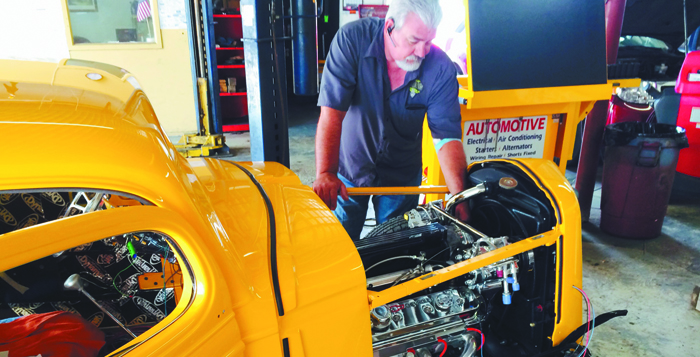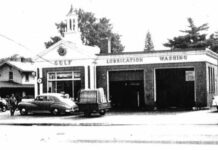What happens when the owner of an independent body shop suddenly becomes seriously ill or incapacitated? Typically, it’s a death-knell scenario for an operation. But in the case of John Verlennich, who was suddenly stricken with a rare neuro-immune disease a little more than a year ago, a strong resolve, a supportive spouse and a seasoned staff prevented that from happening.
Verlennich, owner of Custom Touch Paint & Body shop in Pantego, Texas, awoke on June 10, 2014, with no feeling in the lower half of his body. Diagnosis of his sudden and baffling ailment took awhile, but doctors finally concluded that Verlennich was suffering from Transverse Myelitis, or TM, a rare inflammatory disease that causes injury to the spinal cord.
“It shut down all my nerves from the waist down,” he recalled. “I was pretty well paralyzed.”
Verlennich came to learn that TM has a estimated incidence of between only one and eight new cases per million population per year. Its cause is sometimes linked to infections and immune-system disorders, but in Verlennich’s case, there was no apparent risk factor, although vaccinations such as flu shots have been suspected but not clinically proven. The shop owner said he received his first-ever allergy shots the week before he fell ill.
Confined to the hospital, Verlennich was not about to let the business he founded three decades before fail. He decided to have the shop’s phone bumped to his cell and would answer it “as if nothing was wrong — business as usual,” he said.
His wife, Catherine, would shuttle paperwork back and forth to her husband who would sign off on invoices, checks, parts orders, job sheets and other business from his bed. Meanwhile, three long-time contract workers he employed stepped up and seamlessly handled repair and custom jobs. The shop’s work flow continued unabated even as Verlennich was confined to home for almost six months after his hospital release.
Most people with transverse myelitis recover at least partially and the owner has regained some of his strength plus the partial use of one of his legs, he said. He returned to work last winter and now traverses his multi-bay, 6,000-square-foot shop in a scooter, working mildly restricted hours from about 9 a.m. to 3 p.m. daily. While he isn’t quite able yet to roll up his sleeves and assist in much physical labor, Verlennich was navigating the shop well during a mid-June morning visit from Automotive Report, greeting vendors, answering calls and checking jobs.
Verlennich opened Custom Touch Paint & Body in 1984 at its locale in Pantego, a small town-within-a-town surrounded by the city of Arlington. Over the years, the shop evolved into one of the Southwest’s premier classic-auto customizers, routinely producing award-winning work that won auto shows and was featured in an array of trade magazines. Not long ago, a 1966 GTO renovated and customized at Custom Touch was declared grand-prize winner in Auto Enthusiast, earning the center spread. In past years, a 1953 Ford panel truck done there was named Truckin’ magazine’s “Grand Champion,” a customized Harley was honored as Easyrider’s best bike, and a 1946 Ford was featured prominently in an issue of Classic Trucks. His shop was also named “Business of the Month” in the city.
Over the years, Custom Touch has done work for numerous VIPs, including a job in the 1980s on a 1955 Rolls Royce owned by the late music icon Liberace, plus jobs for several members of MLB’s Texas Rangers and NBA’s Dallas Mavericks, among other celebrities. The Liberace Rolls, which had only 13,000 original miles, was being put up for auction locally, and its new owners needed it in prime shape in just four days. So they brought it to Custom Touch.
“They wanted it sanded and two-toned,” Verlennich said. “So we worked through the nights and it was ready on time.”
In the 1990s, the shop created a unique custom truck for former major league power-hitter Cecil Fielder who requested a miniaturized version of it for his son, Prince, who grew up to become a star for the Rangers, who coincidentally play at Arlington’s Globe Life Park six miles away from Verlennich’s shop.
Verlennich has lived nearly all of his life in the Arlington area, moving to Texas from Minnesota as a tot. How did Verlennich gravitate to the body-shop business?
“I ended up wrecking so many cars and because I couldn’t afford to fix them,” he said, “I thought I better find a way to do it myself.”
During our visit, the shop was juggling more than a half dozen custom jobs, including a 1966 Ford Mustang, 1970 Chevy pick-up and a brilliantly-painted, yellow 1934 Chevy. Long-time customizer and wiring expert Bob Kiker, who rents his own space from Verlennich at the site and does electrical and mechanical work for the body shop, had the dash off of the 1934 Chevy to wire it. Kiker, whose father founded Arlington Alternator and Starter Service, has worked in the industry since he was a kid and has been a fixture at the Pantego location for 10 years. He has a webpage at www.aacestech.com.
Custom Touch also does a fair share of higher-margin insurance work, though major insurers have effectively whittled that percent down over the years by aggressively steering work to preferred shops, the owner said. At one point, Verlennich ramped up his operation to suit the direct repair program specs of a major insurer but received only a trickle of work before the insurer declared his shop too small for DRP. Verlennich has seen the local ranks of small independent area shops dwindle by about a half in the past 10 years due to various economic and industry pressures.
Also impacting small shops is the trend of insurers declaring cars “totaled” that would have otherwise gone to body shops for repair in the past, the owner said. That has opened the door for a growing number of rebuilders to buy such damaged vehicles at auction and repair and resell them, Verlennich said. Custom Touch has a crossdraft paint booth that will have to be modified soon to abate potential fire hazards due to new OHSA rules, he said. Other tools of the trade at the shop include an EZ Liner II Frame Machine.
Verlennich sees himself spending another four or five years or so as shop owner. Although most victims of Transverse Myelitis don’t improve much beyond six or so months after onset, Verlennich hasn’t given up on increasing his mobility.
“I think I will be able to walk with some assistance in a year or so,” he said.



